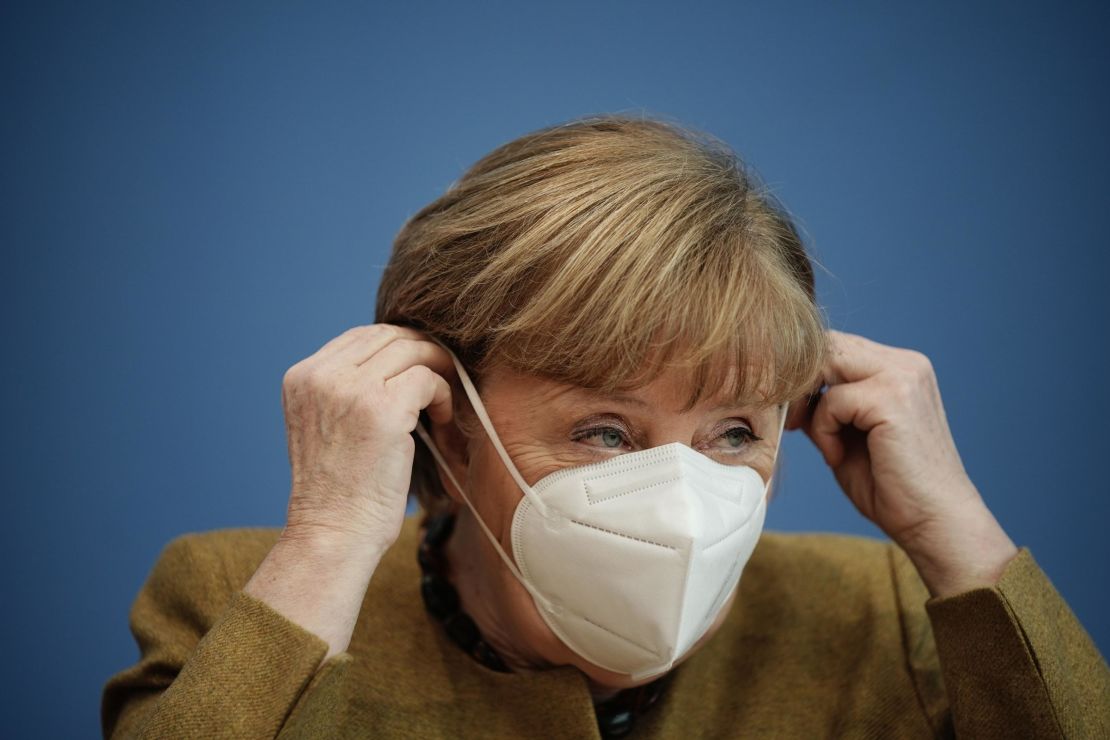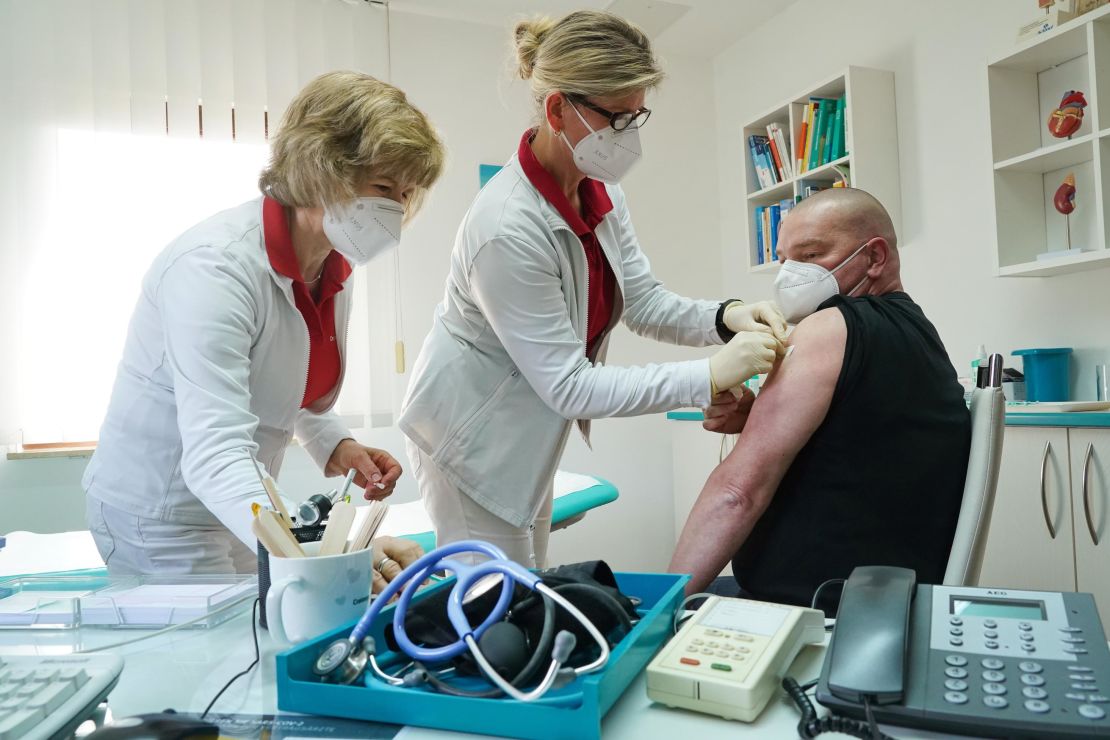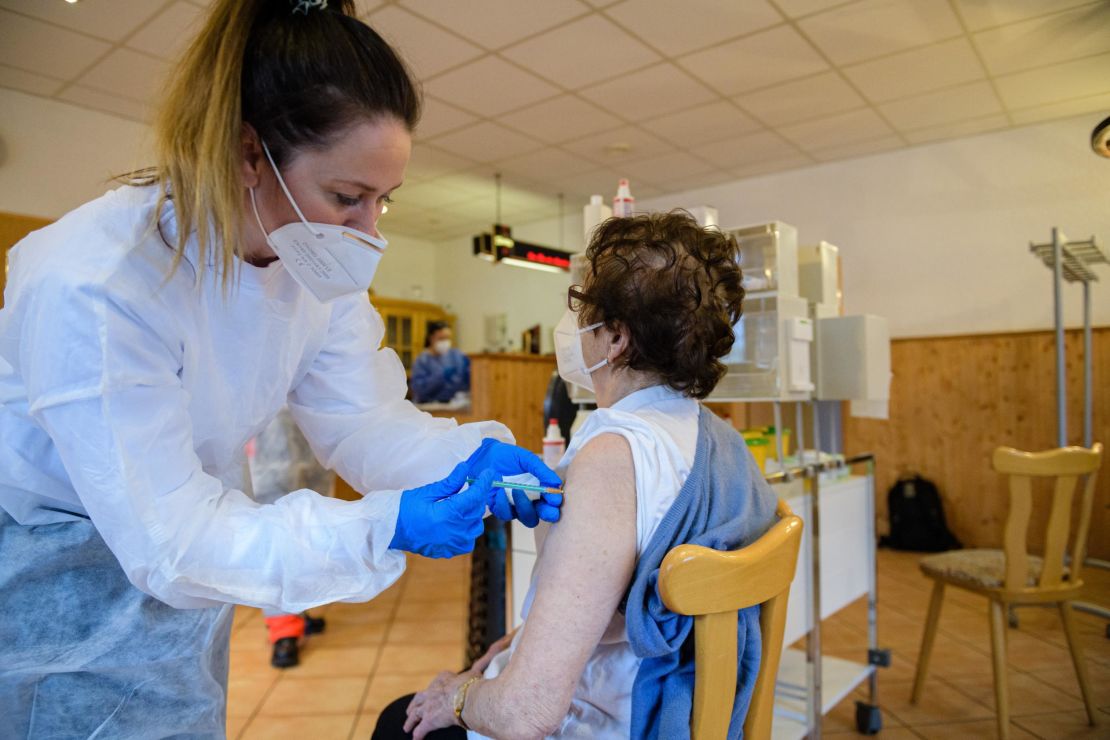The fridges are here but the shots are not.
Doctor Sibylle Katzenstein spent thousands kitting out her Berlin practice so she could administer Covid-19 vaccines as fast as possible, but she is yet to receive a single dose.
“It would have been nice if I had at least 10 vaccines in my fridge. It cost me a lot of time and frustration and in the end these people who need it, they didn’t get vaccinated,” Katzenstein said.
The general practitioner says she has no idea how to get her vulnerable patients vaccinated after repeatedly lobbying for shots and repeatedly being turned down. “I am very concerned and I don’t know who to turn to.”
She voices the concerns of many – that Germany’s vaccination rollout is a bureaucratic nightmare with deadly consequences.
The country was applauded for its initial handling of the pandemic, thanks to widescale testing and its fast response to the outbreak. Despite a high number of reported cases, Germany’s Covid-19 mortality rate remains low.
But since it administered its first shot in December, Germany has only vaccinated around 6% of the population, with around 5 million first doses and 3 million second doses administered.
Part of the problem is that Germany has only been offering shots at specific vaccine centers and not at doctors’ offices – unlike in the United Kingdom, where local doctors have been vaccinating people for months, and where more than 30% of the population has received a first dose.
Chancellor Angela Merkel has admitted to failings with the speed of the vaccine rollout and said Wednesday that doctors’ offices should be able to vaccinate patients by the end of March.
Katzenstein notes there are around 50,000 general practitioners’ offices in Germany and “it’s a lot easier for patients to reach their own doctor.”
The system for patients to book a vaccination slot at a center is complex, with numerous different processes in the country’s 16 states. Katzenstein argues it’s tricky for a 90-year-old to navigate the online system.
“I think we have a social obligation as a whole society being in lockdown. We need to do everything which is quick, pragmatic.”
Germany has been in varying degrees of lockdown since November and this week restrictions were extended again until the end of March.
But internal logistics and bureaucracy are only part of the issue.
Factors at play
At the start of the pandemic last year, everything was in place for Merkel to handle it with success.
Germany – a country with a global reputation for efficiency – held the EU Council Presidency and in Ursula von der Leyen, a former German defense minister, it had an ally at the top of the European Commission.
When it came time to secure vaccines, Merkel insisted that the EU should focus on procuring shots as a bloc instead of Germany and other member states going it alone. But the EU’s rollout has been slow and plagued by delays.
“Germany is the architect of the European failure because Germany and Merkel were behind pushing for the European process that was a failure from the beginning,” Julian Reichelt, the managing editor of Germany’s largest selling tabloid newspaper Bild, told CNN.
“She wanted to make it all about Europe and her being a great European,” he says.
Last month the newspaper made headlines in the UK when it ran the front page headline: ‘Liebe Briten, we beneiden you!’ [Dear Britain, we envy you] in a pointed message on how Germany was floundering with its vaccine rollout in comparison to Britain’s strategy, which has been widely hailed as a success.
The comparisons to Britain have become even more painful this week as Merkel announced a U-turn on the decision not to authorize the Oxford-AstraZeneca vaccine for people over the age of 65.
The original age cap decision, announced on January 28 by Germany’s vaccination committee (STIKO), was made citing a lack of sufficient data for older age groups in trials. Critics said it harmed public trust in the AstraZeneca shot in a country that suffers from a relatively high level of vaccine skepticism, and set off a domino effect across Europe.
The day after, French President Emmanuel Macron described the AstraZeneca vaccine as “quasi-ineffective” in older people, saying “the first results are not encouraging for those over 60-65 years old.” The claim was disputed by multiple scientists, and real-world data has since shown that the AstraZeneca vaccine is highly effective at preventing hospitalization in older populations.
The likes of France, Spain, Italy and the Nordic nations followed suit, limiting authorization of the vaccine to younger segments of the population. They are also now performing U-turns on their decisions.

The damage is done
The decision by STIKO to initially bar the use of AstraZeneca shots in older populations “really was a mistake” because it resulted in “everyone in Germany” losing confidence in the vaccine, said Dr. Uwe Janssens, head of the German Interdisciplinary Association for Intensive Care and Emergency Medicine (DIVI).
Janssens understands why STIKO came to its initial conclusion, and said that if the call had gone the other way, there would have been criticism of that decision too. Either way, he said, “we didn’t have enough vaccine from the beginning because of the consequences of the shopping tour from the European Union, because they didn’t buy enough.”
Tobias Kurth, a professor of public health and epidemiology and the director of the Institute of Public Health at the Charité university hospital in Berlin, described the German regulator’s original decision as a “communications disaster.”
A day after STIKO imposed an age cap on the AstraZeneca vaccine, the European Medicines Agency approved it for everyone over the age of 18. The World Health Organization followed suit on February 8.
“They have now corrected their recommendation finally, but now the disaster has already happened,” Kurth told CNN. “People say they don’t want to have the AstraZeneca stuff because it is really bad,” and there’s no way to correct them because “you can’t get it out of people’s heads.”
Last month a spokesman for Merkel took the extraordinary step of tweeting that the “AstraZeneca [vaccine] is both safe and highly effective,” following reports that Germans were turning it down.
There are currently around 1.3 million doses of the AstraZeneca sitting unused in storage in Germany, partly due to the fact elderly populations until now have not been allowed to take it. Some Germans also see the AstraZeneca vaccine as a lower quality shot, because of its slightly lower efficacy rates compared to other authorized vaccines.
CNN has contacted the German Ministry of Health for comment.

‘Complaining about a candy’
Those running a vaccination center at Berlin Brandenburg airport, which administers both the Pfizer-BioNTech and the AstraZeneca vaccine, say early on barely anyone wanted AstraZeneca, but that is now changing.
“My impression and what the numbers tell us is that the acceptance of the AstraZeneca vaccine is rising. We can see that with the bookings. It started very slowly, but as of yesterday evening 80% of the available appointments have been taken,” Christian Wehry, a spokesperson for the Association of Health Insurance Physicians Brandenburg said.
“I think people in Germany are just too spoiled. It reminds me of children playing on a playground, complaining about a candy, thinking they deserve another candy because someone tells them it’s better,” Thomas Buchhammer, a medical doctor, told CNN after he received his first dose of the AstraZeneca vaccine on Thursday at the vaccination site.
STIKO changed course and approved the AstraZeneca vaccine for over-65s, citing new data, on Thursday. It said in a statement that its previous recommendation on January 28 “was completely correct based on the data available at that time.”
Meanwhile, Merkel – speaking ahead of the STIKO statement – announced Wednesday that the interval between administering first and second doses of Covid-19 vaccines would be stretched “to its maximum” in order to “vaccinate more people faster for the first vaccination.”
The Chancellor said there would now be a 42-day gap for the second Pfizer shot and a 12-week one for the second shot of Oxford/AstraZeneca – a move that is more in line with the UK’s policy of administering second doses of both AstraZeneca and Pfizer towards the end of a 12-week gap.

The changes to Germany’s dosing strategy came after real world data from studies appeared to vindicate the British strategy of vaccinating as many high-risk people as possible with the first dose.
The UK has vaccinated more than 21 million people with a first dose and around 1 million have received a second dose.
German Social Democratic politician and health expert Karl Lauterbach says Germany made a mistake with its initial AstraZeneca decision but even if the age cap hadn’t been implemented, the UK still has better vaccination capabilities.
“Even if it wasn’t for the AstraZeneca vaccination not being taken up, we would still not be able to vaccinate much more people because we are lacking in vaccines,” Lauterbach said. “Basically the EU Commission was not strict enough, not fast enough and not providing enough money for making more vaccinations available in a shorter period of time.”
The European Union, which was slower to authorize vaccines for use than the UK, waged a war of words with AstraZeneca over delays in supply in late January. On Thursday, Italy announced it had imposed an export ban on 250,000 AstraZeneca vaccine doses destined for Australia, citing supply delays and a continuing shortage of vaccines in the EU and in Italy.
Lauterbach concedes the EU’s “procurement of the vaccine was slow. Price considerations were overwhelming. Capacity was not given the attention it should have been given. So we lost time and we are suffering from a shortage of all the major vaccines.”
Much has been said about the EU’s vaccine failure, with the Commission President von der Leyen admitting herself at the beginning of February that Europe was late to authorize vaccines and too optimistic on mass production.
But Germany’s internal decisions have also left it grappling to get up to speed.
“What was more important to Merkel, was that the EU should get its act together to show that the EU works. Not because of Brexit but because that’s the way that Germany likes to do things,” said Quentin Peel, an Associate Fellow for the Europe Programme at the Chatham House think tank in London.
A recent survey commissioned by state broadcaster ARD revealed Thursday that 73% of Germans are not happy with how the government has dealt with the vaccine rollout.
Germany’s Health Minister Jens Spahn, speaking at a press conference on Friday, said that the country will speed up “in the next few weeks.” He forecast that in April there will be more vaccines available than people who can be vaccinated at vaccination centers. He added that mobile vaccination teams would be introduced to help with the effort and general practitioners should routinely be included in the drive.
Meanwhile, Dr. Lothar Wieler, the head of Germany’s Robert Koch Institute (RKI), warned that “we are still seeing too many deaths” and that the country’s incidence rate is rising again. Wieler said a more contagious coronavirus variant first discovered in the UK has been detected in 40% of new infections after Merkel recently warned the country needs to “proceed wisely and carefully” to avoid a lockdown due to a third wave.
The real-life knock-on effect of a slow rollout is evident for 59-year-old Friederike Bettina Kolster, who has the neurological disease Amyotrophic lateral sclerosis (ALS) and is desperate to get a shot.
As a wheelchair user she has up to 15 people caring for her, increasing her risk of contracting the disease.
“Because I need medical care I can’t protect myself,” she said. “I am in home isolation all the time. I have no contacts outside to minimize the risk.”
“Everyone thinks that I should be in the first group. But because my disease is not listed in the vaccination decree and I am under 60, I actually get counted as a healthy person under 60 initially.”
Kolster describes Germany’s rollout as “extremely frustrating” and says she lives in fear of the disease.
“I don’t care which vaccine I get,” she said. “As long as I am vaccinated.”
This story has been updated to correct the date when the World Health Organization approved the AstraZeneca vaccine for adults. It was on February 8.
Sarah Dean wrote and reported from London. Fred Pleitgen, Nadine Schmidt and Claudia Otto reported from Berlin.


















